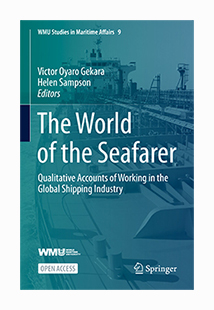Studying seafarers to improve their lives
The World of the Seafarer, edited by Victor Oyaro Gekara and Helen Sampson
Image on landing page: courtesy of SIRC
 When we think of maritime research, we might traditionally assume that this deals mainly with science and engineering, but in recent years, studies of the 'human element' have flourished.
When we think of maritime research, we might traditionally assume that this deals mainly with science and engineering, but in recent years, studies of the 'human element' have flourished.
Some of this has been driven by shipowners' desire to increase the efficiency of their workforce, but there has also been a push by welfare charities and maritime unions to find ways to improve seafarers' mental and physical health – and that's what's behind The World of the Seafarer.
This collection of studies by international maritime researchers has been published as part of a World Maritime University series called Studies in Maritime Affairs, and is available online to download free of charge.
Editors Victor Oyaro Gekara of RMIT University in Melbourne and Helen Sampson of the Seafarers International Research Centre (SIRC) in Cardiff have brought together a powerful set of insights into the lives of seafarers.
A wide range of qualitative data has been collected from interviews with seafarers, their families, and maritime welfare organisations. This type of research is primarily about gathering experiences and opinions rather than statistics, although some statistics can emerge from trends in the data.
Sampson introduces the text by providing a contextual background into the current state of the shipping industry and what it means to be a seafarer. The chapter lays the foundation for the rest of the text – explaining the researchers' aims of addressing the gaps in the literature surrounding the lives of seafarers and to providing a detailed account of the industry.
Part I, Going to Sea, focuses on why the industry is challenging to work in, the motivations of seafarers and the recruitment process. Of particular note is the chapter titled Women Seafarers: An Analysis of Barriers to Their Employment, which shows that despite advances in international policy and recruitment campaigns, the reality of life for women seafarers is often grim. The male-dominated culture and educational barriers to female trainees mean that the proportion of women in the international maritime workforce remains very low.
Part II, Being at Sea, looks at the day-to-day lives of seafarers onboard and the challenges they face working where they live. Researchers explore the physical adjustment to life at sea, health and safety risks, the cultural hierarchies onboard and how all this can impact mental health and wellbeing. The studies also look at contemporary issues of environmental and humanitarian responsibilities placed on the individual seafarers, alongside their responsibilities to their employers.
Part III, Support for Seafarers and Their Families, looks at seafarer support groups and trade unions – with a chapter not to be missed about Nautilus International. The chapter Union Organising in the Context of Regional Labour Market Decline: The Case of Nautilus International, written by editor Victor Oyaro Gekara, provides a historical analysis of the Union's formation, showing how becoming a trans-boundary union with three national branches led to effective joint working between colleagues in different countries and an increase in membership numbers - creating stronger bargaining power with employers.
Part III also contains the stories of seafarers' families, focusing on the difficulties female partners face when their male partners go to sea. The final chapter, On-Line Support Groups for Families in China, looks at how women from across the country support each other when their partners head offshore.
As an academic text, The World of the Seafarer can at times be a heavy read, but there are plenty of case studies and quotes from research participants to lighten the load. And although the book will clearly be a useful resource for those already in the industry, it is also accessible to those new to maritime and keen to learn more about the lives of seafarers in the modern day.
The World of the Seafarer: Qualitative Accounts of Working in the Global Shipping Industry
Edited by Victor Oyaro Gekara and Helen Sampson
Springer Publishing, hardback £44.99
Download available free of charge from the Springer website
ISBN 978 30304 98245
Buy this book in the Nautilus Bookshop
While you're there, why not browse the rest of the titles in our unique maritime bookshop, which sells all the books reviewed on these pages.
Buy nowMore Books
Scottish city's maritime heart
Glasgow Harbour By Graeme Smith and Mike McCreeryFew places are as closely tied to maritime heritage as Glasgow. In this richly illustrated guide, Graeme Smith and Mike McCreery trace the history of the city's Clydeside harbour from its beginnings in the 17th century to its present-day redevelopment.
Standing the test of tide
Piers of England and Wales By Steve EdmundsIn this richly illustrated guide, Steve Edmunds takes readers on a tour of the iconic structures that blend land and sea – home to all manner of amusements and amenities.
Maritime mystery tour
Irish Sea Lime Trade, by David JohnsonIn his attractively-presented book, David Johnson takes us on a tour of historical sites in the Irish Sea lime trade, from South Pembrokeshire up to the Solway Firth, and across to the Isle of Man and Ireland.
From seafarer to force of nature
Gale Force 10, by Nicholas CourtneyFrances Beaufort was born in Ireland to a family of Huguenot descent, and first went to sea in 1789 onboard the ill-fated British East India Company vessel Vansittart. In a fascinating career, he is best known for creating the Beaufort Wind Scale.
